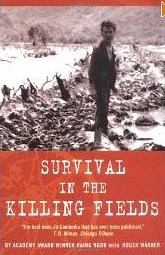Haing Ngor
Survival in the Killing fields

A Cambodian citizen under Pol Pot's communist regime
This is the closest picture to hell I have ever read or heard about. This cambodian civil war (war between fellow-citizens) is nothing short of the ideal governance of a country by Satan himself. The amazing thing about this book is actually not the story itself but the fact that it is so well narrated by an eyewitness civilian, who besides, survives three episodes of torture among many other miseries. It is so naturally and realistically told that it provokes vivid impressions on the reader.
I would like to discourage the view of the film "The killing Fields" as it's nothing close to the voice heard in this book and the facts narrated in it. The movie, more than tedious and flawed, is a poor contribution to the book. Political propaganda, anti-American resentment, and other hatred-filled reasons. The movie's authors -in my opinion- have insulted Haing Ngor by telling a completely different story and shifting the story's hero to the Washington Post correspondent. Nauseating!
I'd like to comment on 3 lines of thought that the reading of this great book left on me.
First (as you'll see in the quotes below) is the much-talked about role of intellectuals in society.
Second, the ascetism of dictatorial leaders (communists or any other breed) that is well studied in 'The Revolutionary Ascetic' by Bruce Mazlish.
And third: A final and personal thought on the condition of human orphanage when separated from God.
Interested at the beginning of the book in finding out how a victim and eye-witness like Haing would discribe this war, I found myself with a more down to earth picture, void of politics and cynicism: the portrait of the human soul.
"What amazed me most about Chea Huon was the change in his character. He was the first intellectual I had ever known. He was very smart. But if he was smart he couldn't possibly believe what he was saying to us now, in the dam dedication ceremony. [...] A story arose that Chea Huon left for the Thai border with his jeep and his bodyguards and bags of dollars and gold. I don't know if it was true, but it is possible."
"Earlier on in the regime, couples who wanted to get married had to get permission from their village chiefs. (...) In prison I had seen lines of women being led away for breaking Angka's puritanical rules of behaviour."
"But the Vietnamese went from one of us to the next, pointing their weapons and asking through interpreters whether we were Khmer Rouge. (...) I thought: Well, it's happening again. They say they are liberating us but they have tied us up. Just like the Khmer Rouge."
